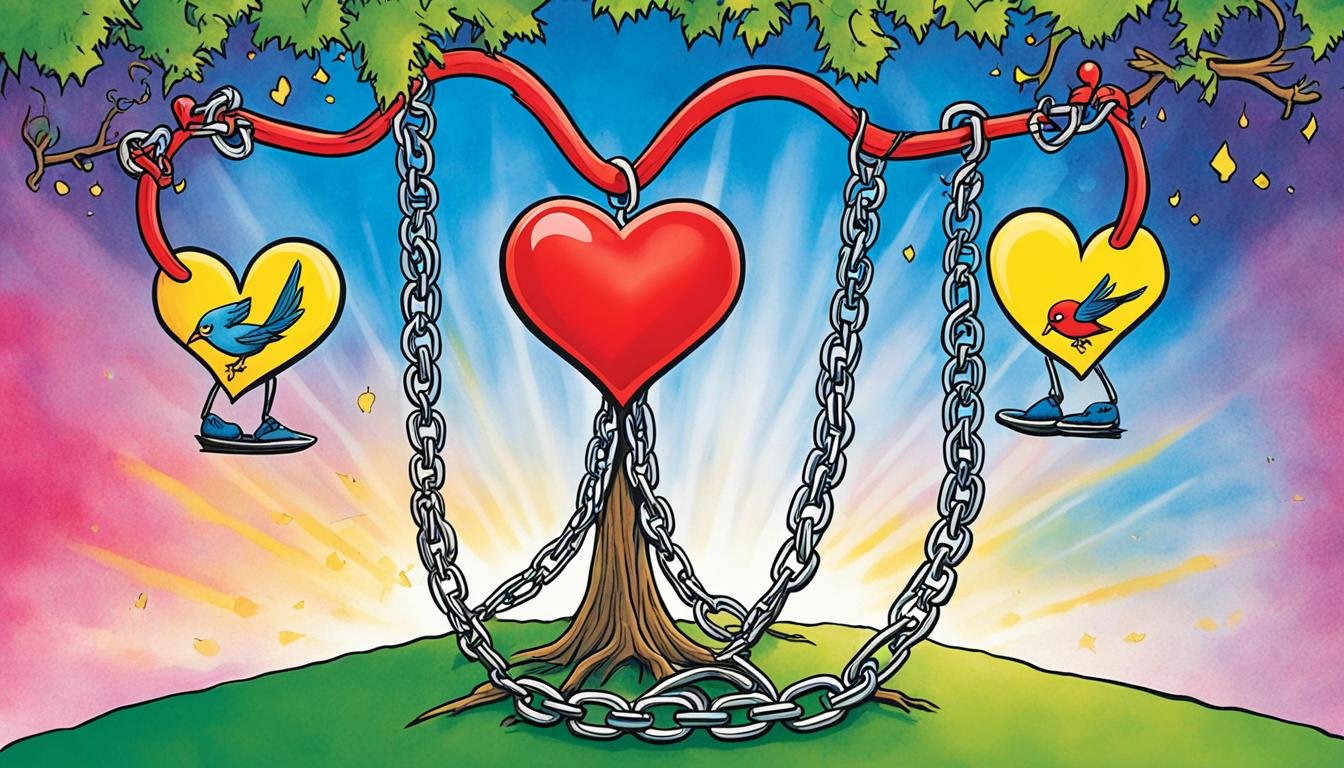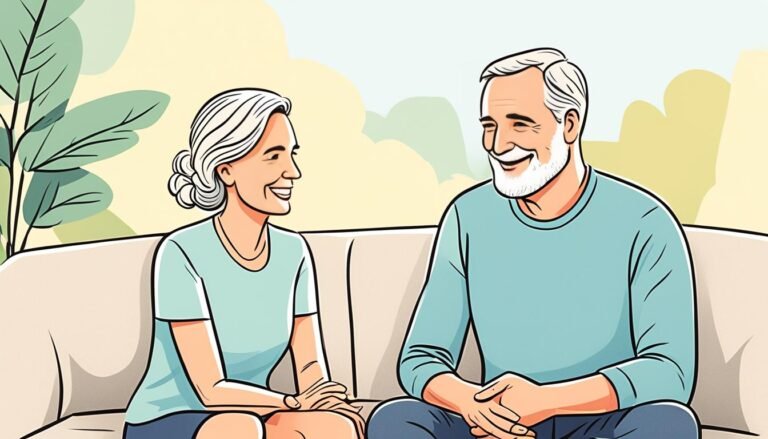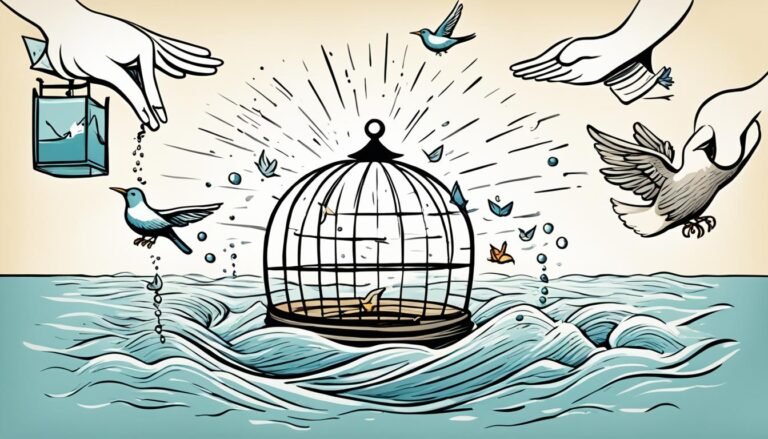Choosing Forgiveness: Liberating the Heart from the Chains of Anger and Resentment
“The weak can never forgive. Forgiveness is the attribute of the strong.” – Mahatma Gandhi
This article explores the powerful impact of forgiveness. Choosing to forgive isn’t simple, but it can bring healing. It leads to peace within, growth, and freedom from anger and resentment. Forgiveness sets the stage for kindness, strength, and healing bonds with others.
Key Takeaways:
- Choosing forgiveness is a sign of strength and resilience.
- Forgiveness can lead to emotional healing and inner peace.
- Forgiveness is a catalyst for personal growth and development.
- Forgiveness can foster compassion and empathy.
- Through forgiveness, conflicts can be resolved and relationships can be reconciled.
The Healing Power of Forgiveness
Understanding how forgiveness can heal our hearts is the first step. It’s about finding inner peace and feeling free. By forgiving, we make room for positive change and healing.
Forgiveness isn’t straightforward, but it changes us deeply. When we forgive, it’s like throwing off a heavy load. This action helps us head towards finding inner peace.
Quote:
“Forgiveness does not change the past, but it does enlarge the future.” – Paul Boese
Forgiving means we must learn to release. It’s about letting go of pain and moving past hurt. This helps us be kind to ourselves and others. It leads us back to our true self.
Techniques for Letting Go:
- Practice self-reflection and self-forgiveness
- Engage in deep breathing exercises to release tension
- Journaling to express and release emotions
- Seek support from trusted friends, family, or professionals
Forgetting and letting go are active efforts. They help us heal from anger and hurt. Forgiveness leads us to inner peace and well-being. It starts a journey of healing and growth.
The Journey Towards Inner Peace
Cultivating inner peace is key for personal growth. It helps us find solace and contentment inside. Forgiveness is a main path to inner peace. It helps release anger and resentment, bringing calm and serenity.
Forgiving lets go of bad feelings and the past. It frees us from old chains, making room for growth. Showing kindness to ourselves and others opens the door to healing and peace.
The Role of Mindfulness
Mindfulness is essential for our inner peace journey. It means being fully in the present, without judgment. This stops us from being led by our thoughts, and lets us find clarity and calm.
Being mindful helps us understand our needs and feelings better. It builds a connection with ourselves and others, encouraging kindness. With this, we can handle difficulties with grace and choose forgiveness for peace.
Practices for Calm and Serenity
For calm and serenity, we should add certain practices to our lives:
- Meditation: It quiets the mind, helping us find inner peace and a deeper self-connection.
- Gratitude: Focusing on what we’re thankful for shifts our focus to joy and peace.
- Journaling: It gives us a way to understand our thoughts better, an important step towards peace and clarity.
- Nature Immersion: Being in nature is calming and helps us stay present, finding peace.
“The journey towards inner peace begins with forgiveness and mindfulness. By letting go of past grievances and cultivating compassion, we create a space for personal growth and find solace within ourselves.” – Unknown
Making forgiveness and mindfulness part of our daily life leads to inner peace. This peace affects our relationships, work, and general health. Forgiveness is a key step to living authentically, growing personally, and reaching harmony.
Nurturing Personal Growth Through Forgiveness
Forgiveness is key for personal growth. It helps us become more resilient, self-aware, and compassionate. We let go of anger and resentment. This makes space for peace and growth within us.
It takes courage to forgive. But, by letting go of past pains, we can grow and change. We shed old, negative habits. This allows us to build better relationships, with others and with ourselves.
The Power of Self-awareness
Forgiveness boosts self-awareness. It makes us look at our feelings, thoughts, and actions. Through forgiveness, we better understand what triggers us. It starts our journey towards growth. This helps us see the world differently and make choices that fit our values.
It also makes us look at our part in conflicts. This means owning up to our mistakes and flaws. Doing this helps us grow and change for the better.
“Forgiveness is not an occasional act, it is a constant attitude.” – Martin Luther King Jr.
Cultivating Compassion
Forgiveness helps us be kinder, to ourselves and others. It shows us that errors and pain are part of being human. This makes us more empathetic. It helps us be kind and understanding, even in tough times.
Being compassionate is vital for growing as a person. It deepens our connections with others. Through forgiveness, we spread positivity. This brings peace not just to us, but to those around us too.
The Transformative Journey
Forgiveness is truly transformative. It helps us leave behind anger and hurt. This opens the door for love, joy, and deep fulfillment. Forgiveness boosts our strength. It helps us face challenges and grow, stronger than before.
It also teaches us to accept our flaws and be at peace with who we are. We find the power to let go of pain. This brings a deep peace to our lives.
Forgiveness is a journey that keeps on giving. It needs patience, focus, and love for oneself. This path leads to a life full of purpose and joy.
Building Resilience Through Forgiveness
Forgiveness is more than just moving past anger or hurt. It also helps us become more resilient. Being resilient means we can handle tough times well and come out stronger. So, by forgiving, we gain the strength to tackle life’s hurdles.
Forgiving may not be easy, for others or even for ourselves. But, it’s crucial for growing personally. It means dropping grudges and trying to see things from the other’s side with compassion. This leads to healing and personal growth for all.
Forgiveness is not an occasional act; it is a constant attitude. – Martin Luther King Jr.
Choosing to forgive shifts our focus from the past’s hurt to the now. This fresh look helps us grow and grab chances to get better. It helps us leave behind anger and move towards a happier, stronger future.
Strategies for Building Resilience through Forgiveness
Make forgiveness a way to build up your resilience with these tips:
- Practice self-reflection: Think about the events that made forgiveness necessary. Understand your feelings and how they impact you. This process helps you find clarity and peace.
- Cultivate empathy: Try to put yourself in the other person’s shoes. Seeing things from their view creates understanding and connection.
- Set boundaries: Forgiving doesn’t mean tolerating harm or disrespect. Set clear boundaries to keep yourself safe and well.
- Seek support: Reach out to loved ones or professionals for advice. Their perspective and support can aid you in the forgiveness and resilience journey.
- Practice self-care: Look after your body and mind. Doing things you love and that relax you is crucial for your resilience.
Remember, building resilience takes time. It’s a path that winds through patience and commitment. By forgiving and being resilient, you can handle whatever life throws your way. You’ll create a future full of growth and joy.
The Role of Compassion in Forgiveness
Compassion is key when choosing forgiveness. It’s at the heart of moving past anger and choosing healing and growth. With compassion for both ourselves and others, we can forgive and change.
Forgiveness might not be easy, but with compassion, we understand better. Compassion shows us we all make mistakes. It helps us connect and feel empathy.
Choosing to forgive because of compassion breaks the chains of anger. It frees our hearts and minds. We take charge of our growth, with a mindset focused on learning and resilience.
“Compassion is not just about feeling sympathy for someone, but taking action to alleviate their suffering.” – Dalai Lama
Being compassionate helps us forgive others and ourselves. We learn to forgive our own faults. We see them as steps towards becoming better.
Compassion also helps build deeper bonds with others. It leads to empathy and understanding in conflicts. This can help mend friendships and relationships.
The Power of Compassionate Forgiveness
Forgiveness from a compassionate place can heal us and our world. It makes us part of a caring and understanding community. This can touch many lives in a positive way.
Compassion helps us grow inside. It makes us more aware, empathetic, and emotionally intelligent. We can then use forgiveness to change and find peace.
On our forgiveness journey, let’s not forget the role of compassion. Let’s forgive with open hearts and minds. This way, we encourage a world filled with forgiveness and compassion, leading to growth, healing, and peace.
Conflict Resolution Through Forgiveness
Finding a way to resolve conflicts can be hard. But, choosing to forgive is a strong step. It changes fights into chances to heal and understand. This leads to making peace in our relationships and areas.
Forgiveness acts as a bridge between those who fight. It helps drop anger for kindness and understanding. When we forgive, we say we know it hurt but we choose to move on.
Listening to the other side really helps in forgiving. Understanding their view breaks walls of confusion. This helps build a connection, leading to healing and peace.
“Conflict cannot survive without your participation.” – Wayne Dyer
Strategies for Transforming Conflicts Through Forgiveness
Here are ways to use forgiveness to fix fights:
- Practice empathy: Try to see things from the other person’s view. This can make compassion and forgiveness grow.
- Communicate openly: Talk openly and listen to each other. This helps share feelings and understandings. Good talk can lead to forgiveness.
- Find common ground: Find things you both care about. This can help in ending the fight. It makes you feel more together and willing to forgive.
Forgiveness needs bravery but it brings big rewards. It lets go of anger and opens to peace. With forgiveness, we step into a world of healing, knowledge, and peace.
Many have shown how powerful forgiveness is. By learning from their stories, we can help make the world kinder and calmer.
Embracing Forgiveness: A Mindful Practice
Mindfulness is key in learning to forgive. It provides deep support. Being focused on our thoughts and actions helps us understand and feel for others.
Mindfulness lets us see our thoughts without judging them. This makes us aware of what makes us angry or upset. Knowing this can help us heal emotionally by understanding and facing our feelings.
“Mindfulness helps us see forgiveness this way: it’s not accepting what others did. It’s about freeing ourselves from anger,” says Dr. Sara Parker. She is skilled in psychology and mindfulness. “It lets us look beyond our hurt and see we’re all human.”
Mindfulness in our forgiveness journey helps us react wisely to hard times. It helps us stop the cycle of anger. This opens the door for us to grow and change.
Mindfulness gives us ways to deal with our emotions and thoughts. A habit of meditation and being aware of our body brings a forgiving mindset. This way, we grow compassion and forgive from the heart.
The Role of Self-Compassion
Mindfulness also teaches us to be kind to ourselves. Understanding our own weaknesses helps us understand and forgive others. Reminding ourselves we all deserve forgiveness is essential.
- Practice self-compassion: Do things that make you feel good and at peace. Be kind to yourself. Know that forgiving starts from within.
- Engage in loving-kindness meditation: Imagine sending love to yourself and those you forgive. This practice deepens your connection and compassion for others.
- Embrace forgiveness mantras: Say things like “I forgive and let go of all anger,” to change how you think and forgive more strongly.
Mindfulness makes the journey to forgiveness powerful. It helps us grow, find peace, and forgive deeply.
Overcoming Challenges in Choosing Forgiveness
Choosing to forgive leads to inner peace and resilience. But, it isn’t easy. We face many obstacles that can test us. Yet, acknowledging these difficulties is crucial.
Self-Forgiveness and Inner Healing
Forgiving ourselves is hard. We often blame ourselves for past mistakes. To forgive, we must heal and be kind to ourselves. This starts by being self-compassionate and dropping self-judgment.
Dealing with Deep-Rooted Resentment
Resentment is a tough challenge. It comes from past pain and sticks with us. Understanding this pain is key. This helps us forgive and heal. Being open with ourselves and others is crucial.
Support from Loved Ones and Communities
Getting support from loved ones and groups is crucial in forgiving.
Having people who value forgiveness is very helpful. They help by sharing their experiences. This gives us a different view. Therapy groups and communities can also help. They provide tools for the journey.
Cultivating Resilience Through Mindfulness
Mindfulness is key in resilience and forgiveness. It helps us be aware of our feelings. This awareness lets us react with empathy. It opens up room for forgiveness.
To forgive, we need to be patient and kind to ourselves. It’s a process that brings peace and growth. By building resilience, seeking support, and practicing mindfulness, we can overcome the path’s challenges.
The Power of Forgiveness in Personal Relationships
Forgiveness is key to personal growth and peace. It strengthens our relationships and brings harmony. It’s a choice that opens many positive doors in our lives.
“Forgiveness is not an occasional act, it is a constant attitude.” – Martin Luther King Jr.
Letting go through forgiveness aids our growth. It cuts ties with past pains. This act lets us move forward spiritually and emotionally.
Forgiving brings us inner peace. It clears away grudges and anger. We welcome a compassionate view, easing conflicts with our newfound understanding.
Embracing Compassion in Relationships
Compassion and forgiveness are deeply linked. They help us show kindness to everyone. This strengthens our bonds, allowing growth and trust.
Forgiveness improves relationships greatly. It enhances communication, trust, and love. Letting go of old grudges allows for growth, harmony, and stronger ties.
“The weak can never forgive. Forgiveness is an attribute of the strong.” – Mahatma Gandhi
Forgiveness is essential during conflicts. It bridges differences and encourages talks. Through it, we learn to understand and heal, leading to better, more fulfilling relationships.
To wrap it up, forgiveness has a huge impact. It fosters growth, peace, and compassion. Choose to forgive in your relationships, and watch them flourish with love and understanding.
Conclusion
Choosing to forgive is transformative and powerful. It leads to emotional healing, personal growth, and inner peace. Letting go of anger and resentment helps break our chains. It starts the journey of emotional healing.
By forgiving, we make room for growth. We learn from our experiences and understand others better. Forgiveness also leads us back to compassion. It makes us feel closer to everyone.
Forgiveness can be hard, but it’s rewarding. It asks for strength and the courage to face our feelings. Yet, the outcome is peace within. Letting go of the past is key to finding joy in the present. It also invites hope for the future.
If you’re thinking of starting your own forgiveness journey, take it slow. It’s normal to need time and support. Acknowledge your feelings and find someone to talk to. Be gentle with yourself as you go through this process.
Choosing to forgive ultimately benefits you. It’s a path to healing, growth, and finding peace within.








